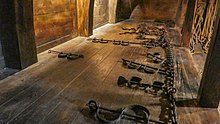John Knight (slave trader)
[2] He operated out of the Port of Liverpool and bought over 40% of his enslaved people from the Bight of Biafra off the West African coast, in the easternmost part of the Gulf of Guinea.
Prior to 1750 the British Crown held a monopoly of rights for slave trading in West Africa with a business called the Royal African Company.
[6] A letter addressed to Knight from Laurens gives insight into the attitude of slave traders to their African captives.
A ship called Emperor and captained by Charles Gwynn had embarked from Africa with 390 enslaved people on board; 120 of them had died.
Laurens also wrote that the price of enslaved people was too low - because crops of rice and indigo were selling poorly, necessitating the use of less labour.
Laurens also wrote to Knight about a bill before the colonial assembly that would tax and effectively stop the slave trade for three years from 1766.


